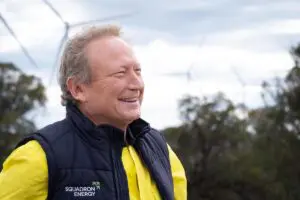A leading barrister has warned that regulations issued by federal energy minister Angus Taylor, designed to open up the Australian Renewable Energy Agency (ARENA) to fund a range of non-renewable energy technologies that includes carbon capture and storage, could be unlawful and are vulnerable to a legal challenge.
In a legal memo seen by RenewEconomy, barrister Fiona McLeod SC warns that the latest regulations issued to ARENA could be unlawful on several grounds, including that they are beyond the “regulation-making” powers conferred on Angus Taylor as the federal energy minister.
Legal principles dictate that while Taylor can issue new regulations to guide the operations of agencies like ARENA, any such regulations cannot go beyond the purpose of the parent ARENA Act approved by parliament.
The advice says that because the ARENA Act makes clear that the purpose of the renewable energy agency is to support the uptake and competitiveness of renewable energy technologies, Taylor’s attempt to open it up to non-renewable energy technologies is likely to be unlawful.
Specifically, McLeod SC, who previously served as head of the Law Council of Australia, says that regulations that extend ARENA’s funding to freight fuel efficiency grants, low emissions aluminium and steel production, industrial energy efficiency programs, carbon capture and storage projects, and soil carbon projects are beyond the scope of the ARENA Act.
It would leave any funding awarded to non-renewable energy projects by ARENA vulnerable to a legal challenge, and a court could overturn the funding at any point in the future.
Environmental Justice Australia, which commissioned the advice, said that it highlighted the significant issues with the Morrison government’s attempts to divert funding from renewable energy technologies.
“The legal risks of this latest attempt to recast ARENA to fund fossil fuel technologies are now abundantly clear,” Environmental Justice Australia’s senior climate specialist lawyer, Hollie Kerwin, said
“For ARENA, there may well be questions about the certainty of any actions it has taken or will take based on the government’s new regulation.”
“It doesn’t matter whether you look at this in legal or policy terms – trying to take ARENA’s eyes off its renewables mission right now is a high risk, bad move. ARENA has a critical role to play in ensuring a safe climate for all Australians and that we can take our place as a renewable energy super power.”
Taylor had an earlier attempt to introduce regulations cancelled out by the federal senate in June, after Labor, the Greens, and most of the crossbench voted to disallow the regulations.
Taylor issued a new set of regulations in July, with some changes, some of which were superficial.
McLeod SC also warned that a number of the provisions contained within the ARENA regulations could be ineffective, as they are substantially the same as an earlier set of regulations that were cancelled out by the federal senate.
While ministers have the ability to issue new sets of regulations without having to seek approval from parliament, each house of federal parliament retains the ability to “disallow” any set of regulations it may disagree with.
Legal principles would dictate that any re-issued regulations that are substantially the same as those previously disallowed would have no legal effect. This generally prevents ministers from defying the intentions of parliament by simply remaking regulations that have been cancelled out.
McLeod SC also suggests that Taylor’s regulations could be inconsistent with the ARENA Act as they deprive the agency of “independence and autonomy” that ARENA is supposed to exercise in deciding how to use the funds made available to it.
The concerns raised by McLeod SC have been mirrored by an influential senate oversight committee, which has also raised concerns about the legality of the ARENA regulations.
While Taylor told the committee that he is confident that the regulations remain lawful and within his ministerial powers, the committee said that it remained unconvinced.
Last week, that committee, which includes a majority membership drawn from Coalition senators, recommended that Taylor’s latest regulations be cancelled out or that Taylor needed to introduce appropriate legislative amendments to be voted on by parliament.
Both Labor and the Greens have indicated that they would support a disallowance motion to cancel out the latest set of regulations.
The Smart Energy Council, Solar Citizens, GetUp! and the Australian Conservation Foundation have all expressed support for that position and for ARENA to maintain its focus on renewable energy technologies.
“Diverting ARENA makes no sense, and it’s likely illegal. ARENA was set up to focus on renewable energy and its success has been a big factor in Australia’s enormous renewable energy gains,” the Australian Conversation Foundation’s Gavan McFadzean said.
“That work is not done. ARENA needs to remain Australia’s renewable energy agency, not a diluted agency expected to be the funding vehicle for all the energy Minister’s pet programs.”
Angus Taylor’s office has been contacted for comment.







